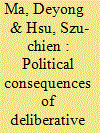| Srl | Item |
| 1 |
ID:
135760


|
|
|
|
|
| Summary/Abstract |
In mainstream political science literature, two main theoretical perspectives on the origins of political trust predominate: institutional theory which argues that political trust is generated from democratic institutions and cultural theory which argues that political trust is rooted in historical-cultural factors such as social trust. However, the influence of other social values, such as authoritarian orientations, has received little attention in the extant literature. This article investigates the determinants of political trust in 13 East Asian societies with a special emphasis on authoritarian orientations. The evidence from our empirical study suggests that authoritarian orientations are an independent cultural source of political trust in these societies.
|
|
|
|
|
|
|
|
|
|
|
|
|
|
|
|
| 2 |
ID:
137459


|
|
|
|
|
| Summary/Abstract |
Since the late 1990s, a large number of electoral reforms have occurred in China's towns and townships across the country. While scattered cases of direct election of township heads happened in the early years, recent cases have acquired very diverse and complicated institutional arrangements. Three ideal types of innovation have emerged that range from competitive selection to direct election. The actual changes to electing or selecting a township leader can be best measured in (1) the degree to which public participation is expanded; and (2) the degree of competition introduced between candidates. In the late 1990s, during the first wave of these innovations, the enterprising cadres in the regime's middle elite, mostly county and city officials, often played a critical ‘crafting’ role, as they responded to local crises in governance or competed for faster promotion. In recent years, amelioration in local governance means crises have become less pressing, while the widespread implementation of reforms means that contained forms of participation and competition are likely to become the new status quo of township institutions.
|
|
|
|
|
|
|
|
|
|
|
|
|
|
|
|
| 3 |
ID:
159539


|
|
|
|
|
| Summary/Abstract |
Recent research suggests that both electoral democracy and deliberative democracy under a nondemocratic regime may help to sustain existing authoritarian rule but is likely to eventually lead to the democratization of authoritarian regimes by eroding its basis in the long term. However, few studies have used comparative methods to empirically analyze the political effects of these two types of democracy together. In this article, we use survey data and in-depth interviews to empirically analyze two local political reform experiments in China. Four fieldwork sites were selected: two where democratic experiments have been implemented and two where no political reform has been implemented. We compared the political consequences of the two locations of democratic reform experimentation using indicators such as political trust, administrative performance, and democratic aspirations. The results show that the electoral democracy experiment delivered better governance and higher political legitimacy than the deliberative democracy experiment, while deliberative democracy performs better than the usual township governance system. Although the results show that the electoral democracy experiment fosters higher democratic aspiration, strong evidence verifying the causal mechanism between deliberative democracy experiment and appeals for democracy has not been found. Based on the empirical findings, we discuss the implications of the two experiments for China's politics.
|
|
|
|
|
|
|
|
|
|
|
|
|
|
|
|